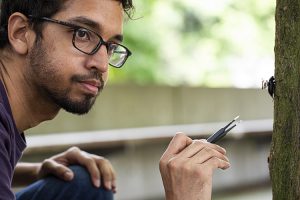
UW ECE doctoral student Vikram Iyer has been recognized as a 2020 Marconi Society Paul Baran Young Scholar. This prestigious award from the Marconi Society acknowledges Iyer’s innovative work developing bio-inspired and bio-integrative wireless sensor systems.
On August 4, 2020, The Marconi Society recognized Vikram Iyer, a Ph.D. candidate in the University of Washington Department of Electrical & Computer Engineering (UW ECE) as a 2020 Marconi Society Paul Baran Young Scholar. The award acknowledges Iyer’s innovative work developing bio-inspired and bio-integrative wireless sensor systems. The Marconi Society celebrates, inspires and connects innovators building tomorrow’s technologies. The organization’s Young Scholar Award recognizes the world’s most innovative young researchers who are creating tomorrow’s information and communications technology in service of a digitally inclusive world.
Iyer’s contributions enable traditionally stationary Internet of Things (IoT) devices to move, putting a new and scalable category of data collectors into the world to help us understand our environment at scale and with a fine degree of detail.
Iyer began by developing ultra-low power wireless communication and localization techniques for IoT devices and then became interested in applying these to tiny, bio-inspired robots the size of an insect. “I realized many of the technologies I had been developing for IoT devices were ideal for these robots that are so small they can’t even carry a battery,” Iyer said. His work on wireless power transfer resulted in the first wireless liftoff of the lightest aerial vehicle to mimic insect flight.

Iyer has developed a wireless sensing platform that can be deployed on insects. Most recently, he integrated more complex sensors, like wirelessly steerable cameras, into an insect “backpack” (see photo above).
This inspired him to explore an alternative, biological solution for sensor mobility. “We had to work really hard just to get a robot to lift off, and commercial drones can only fly for around 20 minutes while live insects like bees can fly for hours. This made me wonder, rather than building a system that mimics an insect, could we augment live insects with sensing, computing and communication functionalities to create a mobile IoT platform?” Iyer remarked. He developed a wireless sensing platform that could be deployed on bumblebees, which includes backscatter communication, low-power self-localization hardware, sensors and a power source. “We could use this platform to study micro-climates on large farms, answer questions about insects’ behavior or collect air quality data at a more granular level than by using a handful of stationary sensors,” said Iyer.
Iyer has recently integrated more complex sensors, like wirelessly steerable cameras, into his insect “backpack” so that biologists could understand the world from the insect’s perspective.
“Vikram is a one-of-a-kind creative interdisciplinary researcher who is also humble,” says Shyam Gollakota, who is a UW ECE adjunct associate professor, an associate professor in the Paul G. Allen School of Computer Science & Engineering and Iyer’s advisor. “He develops creative solutions that are at the intersection of hardware, software and biology. In so doing, he transforms what was once science fiction into reality.”
“By creating low cost, mobile IoT devices that can help answer questions and solve problems in any environment, Vikram’s work supports the Marconi Society’s mission of bringing the opportunity of the network to everyone,” said Vint Cerf, Chair of the Marconi Society. “We are proud to welcome him to the Marconi family.”
Learn more about Iyer’s research through this recent conversation he had with Brad Parkinson through the Marconi Foundation. Parkinson is a Marconi Fellow and was the lead architect, advocate and developer of today’s Global Positioning System (GPS).

